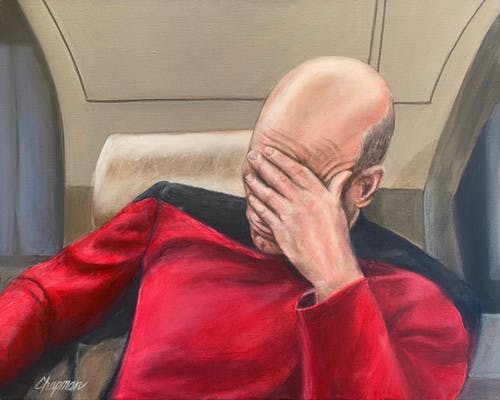In a Scientific American op-ed by sci-fi author, Charles Stross, he made the case for ‘The Torment Nexus’ — that internet meme describing how tech billionaires seem to want to turn every dystopian idea they read as a child into reality.
This is simply not the case and is as much fiction as the books Stross writes himself.
“Billionaires who grew up reading science-fiction classics published 30 to 50 years ago are affecting our life today in almost too many ways to list…” he laments and yet take a walk to your local supermarket and you’ll be hard-pressed to find anyone, anyone talking about living on Mars, jacking in to the Metaverse, or wanting to live till they’re 150.
Science fiction has been around a hell of a lot longer than the 1970s and to say that this was the era of the genre that billionaires grew up with makes a sweeping assumption that someone with a mild intellect to create their own empires and read the future ahead to capitalise on it only understood the science fiction writings of the time.
Stross then goes on to perhaps murder his own argument and that of the science fiction genre itself in one go;
But there is a problem: SF authors such as myself are popular entertainers who work to amuse an audience that is trained on what to expect by previous generations of science-fiction authors. We are not trying to accurately predict possible futures but to earn a living: any foresight is strictly coincidental.
Here we get to the real crux of the problem — science fiction authors have unfortunately forgotten their roots because they need to make money, and the way to make money is to peddle tired and overtrodden narratives over and over again because the audience demands it.
It’s an ever-decreasing circle where to earn a living this generation of sci-fi writers must continually make their audience dumber with each successive book by delivering something that mimics previous works but does not improve upon them.
There is a danger in believing that everything has been imagined or dreamt of in the past 100–150 years of speculative fiction and future generations of science fiction authors cannot think of anything else other than to raid the bargain bins of fiction and apply fresh paint over an old idea. Are we really to accept that sentient spaceships and time-travelling aliens are the pinnacles of modern 21st-century science fiction, dealt with ham-fisted attempts at watered-down social commentary because it might offend someone?
The likes of Le Guin, Cherryh, Dick, Miller, Butler, Atwood, Bradbury, Huxley, and Shelley all wrote science fiction with warnings about the future but with the means to avoid them in the narratives and social commentary. Stross claims that science fiction is not about predicting futures but conveniently forgets that around the same time as the first set of World’s Fairs kicked off, those giant expos that painted much of the future visions we see around us today, H.G. Wells himself coined the term ‘foresight’. In fact, there are practising futurists today who use Science Fiction Prototyping as a means to articulate the future scenarios they are building.
Sci-fi and speculative fiction are still powerful in the right hands.
This is not to say that Stross raises some valid points about the potential dangers of unchecked technological advancement and the influence of potentially harmful ideologies like those found in some classic sci-fi but he makes massive leaps and oversimplifies much of his arguments. Much of the world we see today has indeed been shaped or imagined by science fiction but there is no blueprint or roadmap laid out for the rich to take hold of and run with. Every single person on this planet still has the agency to stand up and say ‘not for me, thanks’.
But Campbell was also racist, sexist and a red-baiter. Nor was Campbell alone on the right wing of SF: for example, bestselling author Ayn Rand held that the only social system compatible with her philosophy of objectivism was laissez-faire capitalism. The appeal this holds for today’s billionaires is obvious.
Stross cherrypicks his arguments to fit the popular narrative that ‘billionaires are bad’ by aiming, again, at a particular sub-section and time period of the genre without offering anything to either really support the case or counter-argue and provide some balance.
Stross’ op-ed is entirely one-sided, that science fiction should stick to writing entertainment, that we should ignore the huge bodies of work reaching back into history because of his perception of only a few, carefully selected writers and their leanings. Science fiction of the past was as much about scientific, political, economic and social commentary of the time as it was about dreaming of grand visions of the future but we simply cannot ignore that it happened.
How many people still believe that H.G. Wells’ The Time Machine is actually about a time machine?!
To go all hand-wavy and declare we shouldn’t pay attention to The Left Hand of Darkness or The Patternist is as big a problem as claiming that Musk’s Mars obsession is dangerous to humankind.
The oversimplification continues throughout the piece, a broad brush attack on science fiction and billionaires ignoring that not all sci-fi is dystopian or riddled with harmful ideologies, and not all tech billionaires are solely driven by TESCREAL ideals (transhumanism, extropianism, singularitarianism, cosmism, rationalism, effective altruism and longtermism). For a science fiction author, there is a disturbing lack of nuance, the article doesn’t acknowledge the positive potential of technology and the many ways it can be used to address real-world problems.
Unfortunately, Stross’ blog reveals the extent of his ire well beyond what the editors could allow on Scientific American (which is still a bit of an oddity to publish this in the first place) and his descent into full on rage against the capitalist machine and the sci-fi politik is evident. I wonder if he ever read The World, The Flesh and The Devil by J.D Bernal, considered by most as a seminal piece of foresight and speculative fiction in 1929. I doubt it because he doesn’t mention it in his diatribe, particularly telling because it probably doesn’t fit the narrative he wants to spin.
Bernal’s work, written in 1929 that eventually spun into more than 100 other books, is a profound inquiry into the future of humanity. It explores three main themes — the future of the physical world (“The World”), the future of human biology and physiology (“The Flesh”), and the future of human psychology and desire (“The Devil”). The book envisions radical transformations in each area, suggesting that humanity will overcome natural limitations through scientific and technological advancements. Bernal speculates about the potential for space colonisation, the modification of the human body through bioengineering and cybernetics, and the evolution of human consciousness and society. The overarching theme is the pursuit of rational and scientific methods to transcend the current limitations of the human condition.
All very familiar themes, all written almost a century ago. All seem to be ignored by Stross in his pursuit to vilify the current crop of entrepreneurs who want to build upon these foundations. Because if it’s not them then it’ll be someone else, Charlie my boy.
If we didn’t have writers like Bernal covering these subjects then how else would we have many of the advancements that healthcare enjoys today if it weren’t for someone else inspired by the same dreaming up shit that NASA poured money into to make a reality for the space programme?
The relationship between science fiction and technology is a complex and multifaceted one. While some sci-fi ideas have inspired technological advancements, it’s important to remember that science fiction is not just dystopian reality and technological development is driven by a multitude of factors, we see dystopia everywhere because it makes for a good story. It’s the conflict, that good must triumph over bad, than humans must win over robots, and these stories are as black and white as the article itself.
The tech industry and Silicon Valley are not monolithic, it is not driven only by billionaires. There’s a vast range of companies, startups and individuals with diverse goals and visions for the future. A point Stross ignores because he’s consumed by what he sees in the gutter tech press. Open and critical dialogue about the potential risks and benefits of technology and the paths to whatever futures lie ahead is essential but we need to have informed and nuanced discussions about how to shape the future we want to see, not just go baiting for commentary.
As much as I dislike where things are heading myself, and hence why I’m exploring science fiction and future visions of the past, it has to be recognised that the only people who can fund the future, whatever shape one or more of them take, are the ones with the money to invest in it. We can’t rely on governments, we can’t rely on charities, we can’t even rely on bodies like NASA because they are now reliant on those very same people with money. Stross has valid concerns about the lack of self-reflection and potential blindspots of today’s billionaire class but allows little room for the positives of their pioneering spirit because it’s easier to appeal to a reader’s disdain for those with money. I’m surprised he didn’t mention anything about not paying taxes just to finish his rant.
In the end, Stross’ words come across as sour grapes. His particular brand of speculative fiction is mere entertainment (his words) and nothing that is worth paying heed to or that speaks deeply in social or political commentary because that’s not what people want to read. He becomes part of the problem in science fiction without offering an answer.
The future is not a self-fulfilling prophecy – 8 billion people on this planet have a voice and that carries far more weight than one person with 8 billion dollars. We just forgot how to exercise it.
And in the same way, today’s science fiction authors have forgotten how to exercise the pen. They’d do well to go back to the past to understand how to write the future.











